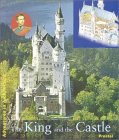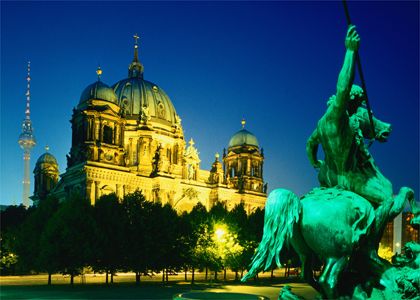Munich
Like many cities, Munich started out as a small town enclosed by a wall and then expanded beyond it. The 'inner city' occupies such a small area that everything is close and easy to visit, and you'll get a sense of the orignal wall, indeed, the gates still remain.
The river Isar flows through the city and it is generally a very green place. The enormous Englischer Garten, is a park with a boating lake and beer garden (of course) and is well worth a visit.
Munich is the largest city in the south of Germany and is about an hour and a half drive from the Alps. Most of the time the mountains are just a dark unclear shadow on the horizon, but with the right weather conditions - specifically a special wind called the Foehn - , they become crystal and beautifully clear. This is when the postcard pictures get taken. Munich is very close to Austria, Switzerland and after a short hop through Austria, also Italy.
It is a mostly flat place and has true continental weather i.e. very warm in the summer, and very cold in the winter. The summer sees quite a few thunderstorms in the evenings, but far more beautiful sunsets. If you come in the winter, bring really warm clothes, in summer the nights are balmy but bring a small umbrella just in case.
Under an hours drive away to the south (with train connections too of course) are the lakes which is where many Muncheners head for during the summer months. These are glacial lakes, and therefore deep and cold till well into summer, though there are also smaller ones which warm up more quickly.
Munich is much more than just the venue for the Oktoberfest, it's the high-tech capital of Germany with many international companies choosing to have their European headquarters here. BMW, MAN (truckmaker) and MTU (aeroengine maker) are also based in Munich as are countless other firms.
It's a super modern exhibition centre, both a film and fashion centre and has the highest density of publishing houses of any place in the world except New York.
You could lose yourself for days in the Deutsches Museum or in any of a number of the other museums and galleries and there are countless beautiful churches and other buildings to explore.
Munich is a very culturally active city too with its orchestras, ensembles, opera houses and theatre. All the major music artists will pass through Munich on their European tours. Flick through any of Munich's events magazines to get a sense of how much is going on and if you're here for a longer stay, there are even two English cinemas as well as a number of English video libraries.
Beer
Any German will tell you that German beer is the best in the world, and having lived here for two years I agree wholeheartedly. Bavaria has a vast number of breweries, large and small and it is worth trying as many different types as possible. Beer is so special to Bavarians, that it isn't even classified as alcohol, it's a 'health drink' and rather amazingly, next to the soft drink machines in factories you can find beer vending machines.
Incidentally beer making ingredients are not allowed to include preservatives or chemicals of any kind. Explore the beer cellars and beer gardens, visit some of the breweries actually in Munich and if you're really keen explore the supermarkets, you'll be pleasantly amazed at the prices.
There are also numerous beer festivals throughout the year with the most famous of all being the infamous 'Oktoberfest' which is definitely worth a visit. Be careful though, the stuff's around 8%.
Besides all this, Munich is a soccer capital with no less than three clubs playing in the Bundesliga, the German equivalent of the English Premier League. The incredible Olympic Stadium complex, Olympic tower and park built for 1973 Olympic games are a must on the visit list.
As soon as the weather is warm, the parks and cycle paths fill up with roller-bladers. During the warmer months on Monday evenings, there is a massive roller blading procession through the city and numbers are usually over 12,000.
In summer, people tip into the mountains to enjoy mountain walking and climbing and when it gets cold again they head off to the mountains nearby to ski.
History
Munich was founded (1158) by Henry the Lion, duke of Saxony and of Bavaria near a settlement (Munichen) that was established in Carolingian times. In 1255 it was chosen as the residence of the Wittelsbach family, the dukes of Bavaria and later became (1506) the capital of the dukedom.
During the Thirty Years War, Munich was occupied (1632) by Gustavus II of Sweden. In 1806 the city was made capital of the kingdom of Bavaria. Under the kings Louis I (1825-48), Maximilian II (1848-64), and Louis II (1864-86), Munich became a cultural and artistic center, and it played a leading role in the development of 19th- and 20th-century German painting.
After World War I the city was the scene of considerable political unrest. National Socialism (Nazism) was founded there, and on Nov. 8, 1923, Adolf Hitler failed in his attempted Munich "beer-hall putsch"-a coup aimed at the Bavarian government. Despite this fiasco, Hitler made Munich the headquarters of the Nazi party, which in 1933 took control of the German national government.
Michael Cardinal Faulhaber, the archbishop of Munich, was one of the few outspoken critics of the National Socialist regime. In Sept., 1938, the Munich Pact was signed in the city; in 1939 Hitler suppressed a Bavarian separatist plot there. Munich was badly damaged during World War II, but after 1945 it was extensively rebuilt and many modern buildings were constructed.
The Swan Prince
 This is King Ludwig's magnificent and most famous castle, built in the neo-late romanesque style. With its turrets and mock-medievalism, its interior styles ranging from Byzantine through Romanesque to Gothic its a real fairy-tale fantasy come true. It was built between 1869 and 1886 for the Bavarian King Ludwig II. A splendid and imaginative "fairy-tale castle" high above the Alpsee lake with the Alps towering above it. This is King Ludwig's magnificent and most famous castle, built in the neo-late romanesque style. With its turrets and mock-medievalism, its interior styles ranging from Byzantine through Romanesque to Gothic its a real fairy-tale fantasy come true. It was built between 1869 and 1886 for the Bavarian King Ludwig II. A splendid and imaginative "fairy-tale castle" high above the Alpsee lake with the Alps towering above it.
Only about a third of the building was actually completed. The 15 rooms you see on the tour show astonishing craftsmanship and richness of detail. Woodcarving in Ludwig's bedroom took 14 carpenters 4 1/2 years to complete. Wagner's operas feature everywhere in the form of murals.
The best view of the castle and a 45m waterfall is from the nearby Mary's Bridge (Marienbruecke), which spans a deep gorge. On the path between this bridge and the castle is a wonderful view of Hohenschwangau and the Alpsee.
Guided tours take about 35 minutes. You have to walk 170 steps up and down, a lift is not available. The castle (like Hohenschwangau) is open daily April to October, 8.30-5.30, November to March 10-4.
BERLIN
Since the Reunification in 1990, Berlin has undergone a process of continual redefinition and change. This richness, created from the injection of the new into a potent historical structure, has become one of Germany's and Europe's premiere cultural attractions.
The restored identity as the nation's capital has been a driving force in both urban design and cultural diversity. Berlin is now world-famous for its international architecture, fine and performing arts.


|







 View movies
View movies


